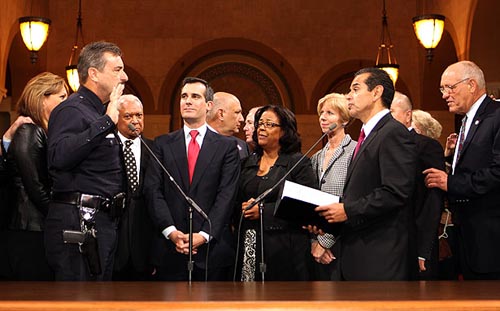One councilman calls the hearing before their vote a 'love fest.' But some warn that the council and chief will soon be butting heads over increasing the size of the police force.
Los Angeles City Council members Tuesday formally appointed Charlie Beck as the city's new police chief, enthusiastically praising the selection of the LAPD veteran for the job, but also acknowledging that the city's ongoing fiscal crisis will inevitably complicate, and perhaps strain, his relationship with elected officials.

Los Angeles Mayor Antonio Villaraigosa swears in new LAPD Chief Charlie Beck, who's surrounded by City Council members and family. (Photo: Al Seib / Los Angeles Times )
Click here to see the LA Times' slideshow of Chief Beck's swearing in.
Council members unanimously approved Mayor Antonio Villaraigosa's nomination of Beck, who becomes the 56th chief of the Los Angeles Police Department.
Surrounded by family and friends, Beck officially began the five-year term when he was sworn into his new position by Villaraigosa following the council's action.
The unusual voice vote, in which each council member stood and expressed support for Beck, came after more than an hour of comments that were remarkable for the complete absence of opposition or serious questioning of Beck and his plans to run the LAPD. During the hearing, Councilman Richard Alarcon made light of the easy pass the council gave the nominee, calling the session a "love fest."
In "previous appointments, there seemed to be elements in the community that had issues with the nominee," Alarcon said. "I can't think of any other situation where a chief has been welcomed so much."
Nonetheless, Beck's ascent to one of the most powerful local law enforcement positions in the nation comes at a time of uncertainty for the department, as the new chief will be expected to sustain former Police Chief William J. Bratton's hard-won gains amid dwindling city coffers.
To do this, Beck and his staff inevitably will tangle with the council as LAPD officials try to secure as much funding as possible, while council members, facing a budget shortfall that could reach $400 million next year, try to rein in spending..
Former chief and current Councilman Bernard Parks jokingly hinted at the rougher treatment Beck could receive in future visits to the council, suggesting that Beck keep a videotape of the confirmation hearing to help him remember the day when the council was entirely friendly toward him.
"There will be dark days," Parks said, turning serious.
Beck, 56, made clear that he has no illusions that the task before him will be easy and he wasted no time in trying to gain an upper hand in what promises to be a long and difficult struggle with the council over the LAPD's size. He gently but unmistakably put the council on notice Tuesday that he believes that the dramatic declines in crime and improved ties with minority communities that the LAPD has achieved in recent years will hinge on whether the council is able to avoid cutting the number of officers.
The current size of the force, which hovers just below 10,000 cops, is the largest it has ever been -- the result of an aggressive push over the last few years by Villaraigosa and Bratton to add 1,000 officers. The council backed the effort until last month when, in the face of the worsening fiscal crisis, it canceled plans for a new class of recruits to begin training this month and ordered the department to slow down the rate of hiring officers. The LAPD remains a few hundred officers shy of the mayor's goal and is permitted for now to replace only officers who retire or leave.
On Tuesday, Beck urged the council to continue increasing the LAPD's size as soon as possible and warned that slips backward would hinder his ability to further ingrain Bratton's progressive reforms into the rank and file.
He evoked the dark memories of previous decades when a severely understaffed force of about 6,500 officers did little more than race from emergency to emergency and alienated the neighborhoods it served.
"To go backward would mean going backward in our ability to police this city," he said in his comments after the hearing.
Beck has made similar statements at several town hall-style meetings in recent weeks, urging residents to tell council members that they want the hiring to resume.
But with the deft manner in which he conveyed his message, Beck underscored a significant difference in style between himself and Bratton.
Bratton, raised on the in-your-face, smash-nosed style of politics favored in New York and Boston, had a sometimes strained relationship with council members, who chafed at the harsh barbs he occasionally tossed at them.
Beck, by contrast, who has served in the LAPD for 32 years, has presented a decidedly quieter and self-effacing manner.
"The big difference between [Beck] and Bill Bratton is he's not going to be confrontational," said Councilman Dennis Zine, an LAPD reserve officer. "He's got the respect of the council, he's got the respect of the mayor. . . . Bratton had a very brash attitude, he alienated a lot of my colleagues. You're not going to see Charlie Beck alienating. What he will do is he will galvanize and we will work with him."
Other council members echoed Zine. Bill Rosendahl, who represents the city's Westside, called Beck's interpersonal skills "a breath of fresh air."
And Jan Perry, who got to know Beck when he ran the LAPD's South Bureau and Central Division downtown, said: "Even when he doesn't agree with you, he's a good listener and isn't dismissive of other viewpoints."
However, Perry cautioned: "He's going to have to be realistic. Any one of us would like to increase the size of the police force, but there may not be the money to do that in the immediate future."











